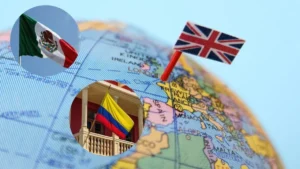Chinese President Xi Jinping has addressed his compatriots with a call for calm. Yesterday he surprisingly published a speech he gave to a small group in February:
“We must maintain historical patience and insist on making steady, incremental progress.” Then came the aimed attack on Western shortness of breath: “You cannot rein in the greed of capital and solve chronic diseases such as materialism and spiritual poverty.”
“The swan song for the Chinese economy definitely comes too soon”
The reason for this Philippika: Current data shows weak points in the Chinese economy that do not harmonize with the planning specifications of the current five-year plan:
- Exports fell by almost 15 percent in July compared to the previous year.
- Youth unemployment has risen to more than 20 percent.
- The original target of 5.5 percent growth was clearly missed last year with 3 percent.
The political actors in the White House are already feeling happy about this weakness of the system rival. US President Joe Biden calls China’s economy a “ticking time bomb”.
But the wish is the father of the thought. “A farewell to the Chinese economy is definitely too early,” Jürgen Matthes, head of regional markets at the German Economic Institute, told The Pioneer: “The country has a technology market that is too strong and continues to grow. While the economic recovery is weaker than many had hoped, economic growth will still be clearly positive this year.”
Here are the hard facts showing that American fears are really American hopes:
1. China is growing twice as fast as the US
The IMF forecasts real gross domestic product growth of 5.2 percent for 2023 and 4.5 percent in 2024. China’s GDP value is thus almost eight percent of the global economy. Even if China grew just 3 percent in 2023, that would be more than half a trillion dollars.
2. Falling imports are a sign of strength
In July 2023, Chinese imports fell by 12.4 percent compared to the same month last year, but the falling imports are not necessarily bad news for China. Jürgen Matthes: “China’s government is deliberately focusing on increasing self-sufficiency in order to reduce its dependency on the West.”
Take the car industry as an example: The CP’s Politburo has launched its own electric car offensive. In the Middle Kingdom you drive a BYD and not a Volkswagen. In the first five months, the Chinese market leader sold three times as many electric cars in its home country as all Western car brands combined. This is reflected in declining import figures.
3. China’s innovative power is increasing
The inventiveness of the Chinese is increasing, as the number of patent applications at the European Patent Office shows. In 2022, 19,041 Chinese patents were registered there – an increase of 15 percent compared to the previous year and fourth place in a global comparison of countries.
4. China’s footprint in Europe is growing
In a recent study, the German Economic Institute comes to the conclusion that Chinese goods are becoming increasingly important for the EU market. While the share of EU imports from China was still 2.6 percent in 2000, the share grew to 8.8 percent last year.
The Europeans mainly buy computers and other electrical and optical devices made in China. Here, the proportion grew from 4.5 percent (2000) to 27.4 percent (2022) in the same period.
5. China is sitting on a mountain of raw materials
The so-called rare earths play a crucial role in the manufacture of all kinds of electronic products. With a market share of almost 70 percent, China is the leading producer of these raw materials. Of all the rare earths on the world market, 34 percent come directly from imports from China.
6. China’s currency reserves are like an ammunition depot
The Chinese currency, the yuan, has depreciated six percent against the US dollar since the beginning of the year. According to media reports, Chinese authorities have now ordered state-owned banks to step up interventions in the foreign exchange market this week to prevent a rise in yuan volatility.
China can afford such interventions. The currency reserves are an expression of strength – and they are significantly higher than those of other industrialized countries. Beijing is bunkering $3.3 trillion for times of crisis. Japan, in second place, comes in at just $1.3 trillion. At the end of 2022, Germany only hoarded just under 300 billion US dollars.
Conclusion
Even in the global downturn, China remains the locomotive of the global economy. If things went as well in Germany as in China, the Scholz/Habeck/Lindner government would be in for a triumphant re-election.
Source: https://www.focus.de/finanzen/news/gastbeitrag-von-gabor-steingart-diw-experte-abgesang-auf-chinesische-wirtschaft-kommt-definitiv-zu-frueh_id_202141161.html


